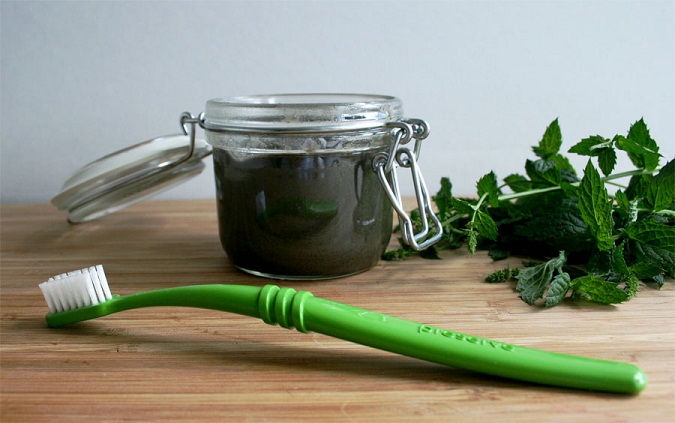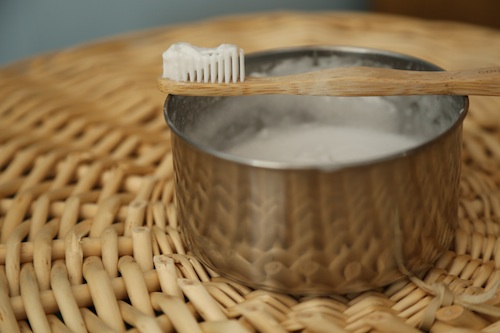Standard toothpaste may not be so healthy as we once thought. Various substances in standard toothpaste can be harmful, and have negative long-term health effects. Homemade toothpaste, by contrast, if prepared correctly, can be not just healthier than normal toothpastes, but also more efficient in cleaning your teeth. In this guide to homemade toothpaste, we will take a look at some preparation strategies, recipes, ingredients and health benefits.
Why bother with homemade toothpaste?
We can appreciate homemade toothpaste only if we understand what substances are found in standard toothpaste recipes, and how they can affect our health. Below, we’ve highlighted some of these substances and their negative effects.
Toxic Toothpaste Ingredients You Need to Avoid
- Glycerin. This substance does no direct harm to your teeth. However, it is capable of disrupting the natural remineralization process.
- Titanium dioxide. This substance makes our toothpaste white. However, there are some safety concerns regarding its effects on the oral tissue. Your teeth turn whiter after brushing not due to the white color of the toothpaste, but due to the removal of food stains and remains. Titanium dioxide thus has no functional purpose in a toothpaste, except to sustain the illusion that “if it’s white, it’s the best thing I can use to whiten my teeth”.
- Fluoride. Fluoride is toxic if ingested, and there is no evidence that it can actually mineralize teeth through brushing.
- Triclosan. This is a known pesticide, and has a negative impact on your hormonal balance.
- Sodium Lauryl Sulfate (SLS) is a detergent, and is linked to oral tissue irritation. Producers sometimes try to hide this ingredient by using different names for it. If you have sensitive teeth or sensitive gums, this substance can cause damage over time.
- Colorants. Some toothpaste is colored, but this is simply done for marketing, not practical, purposes. Artificial colorants are not healthy for your mouth.
- Abrasive elements. Some toothpastes have abrasive elements which can damage enamel.
In conclusion, most mass-produced toothpastes are not exactly safe for your health and may contain chemicals which could trigger various medical conditions. Homemade toothpaste, however, can be not only more efficient, but also much healthier. Let’s take a look at what ingredients you will need. You will be surprised by how easy it is to prepare it.
Best Ingredients for Homemade Toothpaste
Before we move on to the perfect recipe, we will first list some organic ingredients you can use when preparing your own homemade toothpaste. You do not need to use all of them, but they are all suitable for different recipes you intend on using.
- Coconut Oil. An extremely popular ingredient with various health benefits, coconut oil can help maintain a good bacterial-fungal balance in the mouth. This is vital for preventing cavities, tooth decay, and fungal infections. A homemade toothpaste with coconut oil will also carry this benefit.
- Xylitol prevents the spread of bacteria known for causing caries. It is also a sweetener, so remember not to put too much.
- Bentonite clay works as a natural whitening agent for your teeth. It will not damage your teeth, and is beneficial for a balanced oral flora. It is actually so good at cleaning that some companies use it to polish cars.
- Baking soda is alkaline, and reduces the pH level in the mouth. This is very important in preventing tooth decay.
- Essential Oils help you prevent and fight gingivitis and tooth decay. They can also give your toothpaste a nice smell and flavor.
- Sea Salt is a natural cleaner which has antibacterial and mineralizing properties.
Once you have all these ingredients, preparing homemade toothpaste is much easier than you might think.
How to Make Homemade Toothpaste: A Handy Recipe
You would be surprised at how easy it actually is to make your own homemade toothpaste. There is more than one homemade toothpaste recipe. Depending on your particular needs, you can customize it to best assist you with your dental issues.
In order for you to choose the very best recipe to match your needs, we recommend a prior visit to the dentist, who could help you with suggestions as to what ingredients you should use. Some of the ingredients we previously mentioned might not be compatible with certain dental afflictions and/or conditions, so make sure you get at least one expert opinion before you proceed.
Below, we shall present a basic homemade toothpaste recipe. You can always add something else to it or otherwise improve it as necessary. The steps are as follows:
Homemade Toothpaste Recipe Steps
- Step 1. Acquire the following ingredients: Coconut Oil, Bentonite Clay, Filtered Water, Sea Salt, Essential Oils (peppermint or some other aroma you like).
- Step 2. Mix the Coconut Oil (4 tbsp.), Bentonite Clay (4 tbsp.), Water (4 tbsp.), Salt (1 teaspoon) in a bowl. Use a chopstick or a similar tool to make the mixture homogeneous.
- Step 3. Add the Essential Oil and mix again thoroughly.
- Step 4. Put the mixture in a glass jar with a sealable lid.
- Step 5. Test the mixture by putting a small quantity on your toothbrush, and then gently brushing.
- Step 6. If everything is all right by this stage, you can use it as you would use a normal toothpaste.
Advantages of Homemade Toothpaste
Homemade toothpaste, if properly prepared, is an ingenious DYI oral hygiene solution. If you use the right ingredients, you can have all the benefits of normal toothpaste, without being exposed to any secondary effects that mass toothpastes can have. Here are the main advantages of homemade toothpaste:
- It actually works. Homemade toothpaste is widely recognized as a viable alternative to standard toothpaste. In fact, there is evidence that it’s even more efficient than what you would buy in a supermarket if prepared correctly.
- It’s cheap to make. For many recipes, the ingredients are cheap, and you can find them in any supermarket. If you plan it right, you might even end up spending less money on homemade toothpaste than on regular toothpaste.
- Your kids can use it. Because it lacks the artificial chemicals normally found in regular toothpaste, homemade toothpaste is considered safer for kids. However, if you plan on using it for your toddler (or toddlers), it would be best to consult a dentist or a doctor before.
- You can make it taste/smell nice. By adding essential oils, you can give your homemade toothpaste the same pleasant aroma of regular toothpaste. In addition, you can also change and experiment with the aroma, by using many different kinds of oils.
- Color doesn’t really matter. As previously mentioned, the white color of regular toothpaste is given by titanium oxide, which has no medical purpose and might hide nasty side-effects. Colored toothpaste uses colorants, which are also chemicals not entirely safe to use. By contrast, homemade toothpaste does not use any artificial colorants. It will have the natural color of its mix of ingredients. The idea that toothpaste should be white is a smart marketing concept to which we became so accustomed that we forgot to ask “why”.
Drawbacks of Homemade Toothpaste
Despite all these advantages, homemade toothpaste can also have a number of drawbacks, which you should also take into consideration before completely embracing this new solution to oral hygiene.
- Acquiring and preparing the ingredients can be time-consuming. Though making your own toothpaste might sound like fun the first few times, you need to constantly stash ingredients if you want to be able to produce a constant supply. In addition, preparation takes some time, which many of us are simply not willing to spend it in this fashion.
- There is no guarantee that you will get the recipe right. You have to take care to properly mix the ingredients and prepare your product. If you are not careful, you might end up with something you will not enjoy.
- You should consult a dentist or doctor before you start using it. Though its benefits are not generally questionable, every person reacts differently to different substances. The main concern here is represented by unknown allergies, which can be very problematic. It would thus be safer to ask for an expert opinion before going all-in with homemade toothpaste. In addition, the effect of some ingredients during pregnancy should be first evaluated by your doctor, to make sure you are not exposing the baby to any allergic reactions or other less-known effects.
- High-quality ingredients are necessary to make good homemade toothpaste. To achieve the desired result, you need to buy high-quality ingredients and respect the recipe. If you make compromises with ingredient quality, you will also compromise the positive effect on your oral health.
- You have to become accustomed to the new taste and texture. We have been using regular toothpaste for so long that any other taste or texture might seem unacceptable. The clean, white, smooth appearance of regular toothpaste will not be something you will be able to produce at home.
Conclusion
In conclusion, we can confidently claim that homemade toothpaste is a viable replacement for regular toothpaste. The health benefits are clear, and there are no side-effects. However, you should seriously analyze all factors, and ask your dentist before deciding whether to completely give up regular toothpaste. Have you ever used or made DIY toothpaste? What was it like? Share your experience with us in the comment form below!



Leave a Comment